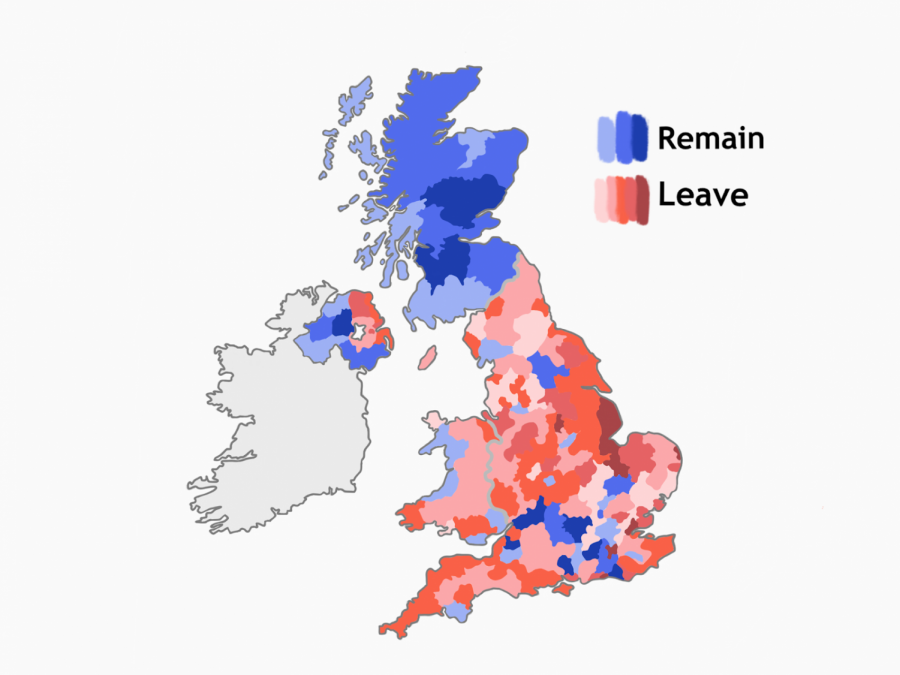BREXITing The Scene
On January 31st, 2020, U.K. Prime Minister Boris Johnson fulfilled his campaign promise to “Get Brexit Done,” but what happens next?
Most voters in England supported Brexit, in particular citizens residing in smaller cities. In the final vote, the support to leave overcame the remaining voters in Scotland, Northern Ireland, and London.
After over three years, seven months, and nine days of contentious debate among the British Parliament, the United Kingdom walked out on nearly half a century of close ties with Europe and officially ended its membership in the European Union (EU) at the end of January 2020.
Shortly after the United Kingdom (UK) joined the EU in 1973, British officials broached the idea of potentially leaving the bloc. Since then, politicians have debated back-and-forth over the pros and cons of membership in the European community of nations. In 2016, an unprecedented influx of refugees in Britain generated a migration crisis and the subject of immigration raged across European politics. Many felt the EU’s imposed migration policies cultivated a source of uncontrolled immigration in Britain. Moreover, citizens pointed out that Britain’s net contribution to the EU budget far surpassed that of many other member nations.
At the same time, individuals supporting the campaign to leave were accused of basing their platform on lies and breaking election laws. The campaigning organization, Vote Leave, was fined £61,000 for overspending and submitting inaccurate information on the payments it received. The group funneled money to connecting campaigns in hopes of increasing support to leave the bloc.
On June 23, 2016, Britons went to the polls to determine whether the electorate would decide to remain in or leave the EU and settle the controversy. The national referendum ended with about 52% voting to leave and 48% resolving to stay. However, this was hardly the end of the discussion; the referendum’s results did not display a unified Britain.
The United Kingdom was torn between two choices: Remain or Leave. Political disparities between various voter demographics highlighted the immense division in national values. Days after the vote, British Prime Minister, David Cameron, resigned from office stating, “The British people made a different decision to take a different path and as such, I think the country requires fresh leadership to take it in this direction.”
Newly elected Prime Minister Theresa May took matters into her own hands. On March 29th, 2017, May invoked Article 50 of the European Union’s Lisbon Treaty. This marked Britain’s formal notice of withdrawal from the EU and initiated a negotiation period of up to two years with the European Council before departure.
Originally, the deadline for negotiations was set in 2019. However, after Theresa May’s several failed attempts at passing a deal through Parliament and her resignation in July, the deadline was extended twice. Pro-Brexit Conservative lawmakers would not accept just any plan that could potentially trap Britain in the European Market. “The point of the agreement was to address the stipulations for the United Kingdom’s exit in a manner that suited both parties. The failure to pass it exacerbated the conflict and led to the current state of Brexit, including the premise of no-deal Brexit, which has severe consequences for the UK and the EU,” said Aaron Peters ’21.
Britain eventually took another foot out of the EU’s door after newly-elected Prime Minister Boris Johnson’s Brexit deal was finally approved by the House of Commons. With an EU-agreed framework for leaving the bloc, Johnson paved the way for the official final deadline on January 31st, 2020. As Europe closes the book on Brexit negotiations, however, Britain braces for the beginning of the withdrawal’s implications on the national economy.
The United Kingdom is currently entering an 11-month transition period. Having lost its membership within EU political institutions, Britain is now holding final discussions to settle any necessary lingering negotiations. Near the top of the UK’s to-do list is to establish final trade agreements concerning manufactured goods and services, which make up a large portion of the British economy.
The December deadline is approaching fast. Whereas Brexit negotiations were extended several times to accommodate shifts in national disagreements over the departure, Prime Minister Johnson is adamant about reaching an agreement by the deadline. “Johnson’s belief in Brexit has steered the negotiations to this point. Regardless of how it may affect the country, Johnson is attempting to exact out his aims for Brexit and make it happen quickly,” said Peters.
EU executives have warned that establishing a trade agreement on such a tight schedule will not be easy. From border disruption to shifts in tariffs, officials must determine the most pressing issues to tackle in the brief amount of time they have left. “The debate over Brexit has paralyzed British politics for years. Lawmakers must not continue down this path of division and should reach a consensus. The United Kingdom should make use of the remaining time in the transition period to the fullest extent,” said June Gao ’21.
British officials have until July 1st to sign off on any extensions to the December deadline. As the date nears, greater volatility in the UK stock will most likely weaken economic activity and corporate worries over Brexit will most likely begin to intensify. Concerns over whether the UK will continue to freely circulate goods within the EU’s single market remain. Europe is also not completely clear on the protocol for checks on goods crossing the borders in Ireland. If these final conversations are anything similar to those for leaving the EU, this would only result in a no-deal Brexit that lawmakers have ultimately been working tirelessly to avoid.
“Johnson’s belief in Brexit has steered the negotiations to this point. Regardless of how it may affect the country, Johnson is attempting to exact out his aims for Brexit and make it happen quickly,” said Aaron Peters ’21.
Karen Phua is a Copy Chief Editor for ‘The Science Survey.’ She enjoys journalistic writing for the connection that it provides with avid readers interested...

